- Home
- F. Scott Fitzgerald
The Best Early Stories of F. Scott Fitzgerald Page 3
The Best Early Stories of F. Scott Fitzgerald Read online
Page 3
What we know for certain is that Rudolph Miller and Jay Gatsby share much in common. Like the young Jimmy Gatz, Rudolph Miller has a need to create an alter ego in order to thrive in a higher class of society than the one into which he was born. Both Miller and Gatsby have fathers who worship at the altar of American materialism, as is clear from Mr. Miller’s adulation of the empire builder James J. Hill and from Mr. Henry Gatz’s reverence for his son’s success, which, if Gatsby had lived, would have made him, according to his father, “[a] man like James J. Hill.”24 In the case of Rudolph’s father, the tension in his life passed down to his son comes from being pulled between his faith in the Roman Catholic Church and his “mystical worship” of Hill. Rudolph’s stunning revelation after his exchange with the deranged priest—the realization that “There was something ineffably gorgeous somewhere that had nothing to do with God”—is a denunciation of at least one of his father’s sacred beliefs. As Fitzgerald put it in a letter, “the priest gives the boy a form of Absolution (not of course sacramental), by showing him that he (the priest) is in an even worse state of horror + despair.”25 Rudolph’s absolution lands him squarely at the doorstep of the modern world where old beliefs no longer prevail—in short, at the doorstep of the Roaring Twenties.
Fitzgerald’s best early short stories, from “Benediction” to “Absolution,” arc elegantly over the Jazz Age, and there is such thrill in their telling that it is perhaps easy to overlook the truth that they are, in the end, cautionary tales. In “Early Success” Fitzgerald said this, in retrospect, about his stories and novels of the early twenties: “All the stories that came into my head had a touch of disaster in them—the lovely young creatures in my novels went to ruin, the diamond mountains of my short stories blew up, my millionaires were as beautiful and damned as Thomas Hardy’s peasants.”26 Indeed, the stories in this collection paint pictures filled with despair as well as euphoria. In them the American flapper is born, she comes of age in a burst of momentary liberation, and she heads toward matrimony. The Southern belle merges with the flapper and explores the world only to move back South to live out her days under a blanket of the chivalric code—in a worst case, marrying a razor manufacturer after a drunken evening and presumably living unhappily ever after. The intellectuals and artists of the stories are driven at best to frustration and irony and at worst to cynicism and suicide from lack of appreciation of their work, while the social climbers find themselves lured into the traps of the very rich, who would toy with them before condemning them to death or prison deep within a diamond as big as the Ritz. And then there are the romantic dreamers, particularly the men: their plight, especially if they happen to be caught in the spell of an enchantress, is youthful disillusionment and finally middle age, during which they can ponder “the gray beauty of steel that withstands all time.”
In the trailing light of these early stories and of The Great Gatsby soon to come, Fitzgerald would spend years, in his words, “seeking the eternal Carnival by the Sea.” By 1931—far too soon, he believed, to write about the Jazz Age with perspective—he was looking back on it nostalgically and from a distant third-person point of view that he hoped would provide objectivity: “It bore him up,” he remembers in “Echoes of the Jazz Age”; it “flattered him and gave him more money than he had dreamed of, simply for telling people that he felt as they did, that something had to be done with all the nervous energy stored up and unexpended in the War.”27 In just a half dozen years more, when the wistful past had become barely a memory to him and the fulfilled future was now itself the wistful past, he would require twilight on the French Riviera to recover the time that had seemed “so rosy and romantic to those that were young then.”28
NOTES
F. Scott Fitzgerald, “Early Success,” The Crack-Up, ed. Edmund Wilson (New York: New Directions, 1945), p. 90.
“Early Success,” p. 90.
“Early Success,” p. 86.
“Echoes of the Jazz Age,” The Crack-Up, p. 14.
“Early Success,” p. 86.
“Early Success,” p. 86.
Matthew J. Bruccoli and Margaret M. Duggan, ed. Correspondence of F. Scott Fitzgerald (New York: Random House, 1980), p. 51.
F. Scott Fitzgerald’s Ledger (Washington: Bruccoli Clark/NCR, 1972), p. 173.
“Early Success,” p. 86.
The Great Gatsby (New York: Scribners, 1925), p. 134.
“Early Success,” p. 89.
This Side of Paradise (New York: Scribners, 1920), p. 304.
“Echoes of the Jazz Age,” p. 21.
“Early Success,” pp. 87–8.
The Romantic Egoists: A Pictorial Autobiography from the Scrapbooks and Albums of F. Scott and Zelda Fitzgerald, ed. Matthew J. Bruccoli, Scottie Fitzgerald Smith, and Joan P. Kerr (New York: Scribners, 1974), p. 97.
Romantic Egoists, p. 79.
Tales of the Jazz Age (New York: Scribners, 1922), p. viii.
The Great Gatsby, pp. 2–3.
The Great Gatsby, p. 134.
The Great Gatsby, p. 3.
“Pasting It Together,” The Crack-Up, p. 77.
Dear Scott/Dear Max: The Fitzgerald-Perkins Correspondence, ed. John Kuehl and Jackson R. Bryer (New York: Scribners, 1971), p. 112.
The Letters of F. Scott Fitzgerald, ed. Andrew Turnbull (New York: Scribners, 1963), p. 509.
The Great Gatsby, p. 202.
Bruccoli and Duggan, Correspondence of F. Scott Fitzgerald, p. 212.
“Early Success,” p. 87.
“Echoes of the Jazz Age,” p. 13.
“Echoes of the Jazz Age,” p. 22.
BENEDICTION
The Baltimore Station was hot and crowded, so Lois was forced to stand by the telegraph desk for interminable, sticky seconds while a clerk with big front teeth counted and recounted a large lady’s day message, to determine whether it contained the innocuous forty-nine words or the fatal fifty-one.
Lois, waiting, decided she wasn’t quite sure of the address, so she took the letter out of her bag and ran over it again.
“Darling”: it began—“I understand and I’m happier than life ever meant me to be. If I could give you the things you’ve always been in tune with—but I can’t, Lois; we can’t marry and we can’t lose each other and let all this glorious love end in nothing.
“Until your letter came, dear, I’d been sitting here in the half dark thinking and thinking where I could go and ever forget you; abroad, perhaps, to drift through Italy or Spain and dream away the pain of having lost you where the crumbling ruins of older, mellower civilizations would mirror only the desolation of my heart—and then your letter came.
“Sweetest, bravest girl, if you’ll wire me I’ll meet you in Wilmington—till then I’ll be here just waiting and hoping for every long dream of you to come true.
“HOWARD.”
She had read the letter so many times that she knew it word by word, yet it still startled her. In it she found many faint reflections of the man who wrote it—the mingled sweetness and sadness in his dark eyes, the furtive, restless excitement she felt sometimes when he talked to her, his dreamy sensuousness that lulled her mind to sleep. Lois was nineteen and very romantic and curious and courageous.
The large lady and the clerk having compromised on fifty words, Lois took a blank and wrote her telegram. And there were no overtones to the finality of her decision.
It’s just destiny—she thought—it’s just the way things work out in this damn world. If cowardice is all that’s been holding me back there won’t be any more holding back. So we’ll just let things take their course, and never be sorry.
The clerk scanned her telegram:
“Arrived Baltimore today spend day with my brother meet me Wilmington three P.M. Wednesday Love
“LOIS.”
“Fifty-four cents,” said the clerk admiringly.
And never be sorry—thought Lois—and never be sorry——
II
Trees filtering light onto dappled grass.
Trees like tall, languid ladies with feather fans coquetting airily with the ugly roof of the monastery. Trees like butlers, bending courteously over placid walks and paths. Trees, trees over the hills on either side and scattering out in clumps and lines and woods all through eastern Maryland, delicate lace on the hems of many yellow fields, dark opaque backgrounds for flowered bushes or wild climbing gardens.
Some of the trees were very gay and young, but the monastery trees were older than the monastery which, by true monastic standards, wasn’t very old at all. And, as a matter of fact, it wasn’t technically called a monastery, but only a seminary; nevertheless it shall be a monastery here despite its Victorian architecture or its Edward VII additions, or even its Woodrow Wilsonian, patented, last-a-century roofing.
Out behind was the farm where half a dozen lay brothers were sweating lustily as they moved with deadly efficiency around the vegetable-gardens. To the left, behind a row of elms, was an informal baseball diamond where three novices were being batted out by a fourth, amid great chasings and puffings and blowings. And in front as a great mellow bell boomed the half-hour a swarm of black, human leaves were blown over the checker-board of paths under the courteous trees.
Some of these black leaves were very old with cheeks furrowed like the first ripples of a splashed pool. Then there was a scattering of middle-aged leaves whose forms when viewed in profile in their revealing gowns were beginning to be faintly unsymmetrical. These carried thick volumes of Thomas Aquinas and Henry James and Cardinal Mercier and Immanuel Kant1 and many bulging note-books filled with lecture data.
But most numerous were the young leaves; blond boys of nineteen with very stern, conscientious expressions; men in the late twenties with a keen self-assurance from having taught out in the world for five years—several hundreds of them, from city and town and country in Maryland and Pennsylvania and Virginia and West Virginia and Delaware.
There were many Americans and some Irish and some tough Irish and a few French, and several Italians and Poles, and they walked informally arm in arm with each other in twos and threes or in long rows, almost universally distinguished by the straight mouth and the considerable chin—for this was the Society of Jesus, founded in Spain five hundred years before by a tough-minded soldier2 who trained men to hold a breach or a salon, preach a sermon or write a treaty, and do it and not argue . . .
Lois got out of a bus into the sunshine down by the outer gate. She was nineteen with yellow hair and eyes that people were tactful enough not to call green. When men of talent saw her in a street-car they often furtively produced little stub-pencils and backs of envelopes and tried to sum up that profile or the thing that the eyebrows did to her eyes. Later they looked at their results and usually tore them up with wondering sighs.
Though Lois was very jauntily attired in an expensively appropriate travelling affair, she did not linger to pat out the dust which covered her clothes, but started up the central walk with curious glances at either side. Her face was very eager and expectant, yet she hadn’t at all that glorified expression that girls wear when they arrive for a Senior Prom at Princeton or New Haven; still, as there were no senior proms here, perhaps it didn’t matter.
She was wondering what he would look like, whether she’d possibly know him from his picture. In the picture, which hung over her mother’s bureau at home, he seemed very young and hollow-cheeked and rather pitiful, with only a well-developed mouth and an ill-fitting probationer’s gown to show that he had already made a momentous decision about his life. Of course he had been only nineteen then and now he was thirty-six—didn’t look like that at all; in recent snap-shots he was much broader and his hair had grown a little thin—but the impression of her brother she had always retained was that of the big picture. And so she had always been a little sorry for him. What a life for a man! Seventeen years of preparation and he wasn’t even a priest yet—wouldn’t be for another year.
Lois had an idea that this was all going to be rather solemn if she let it be. But she was going to give her very best imitation of undiluted sunshine, the imitation she could give even when her head was splitting or when her mother had a nervous breakdown or when she was particularly romantic and curious and courageous. This brother of hers undoubtedly needed cheering up, and he was going to be cheered up, whether he liked it or not.
As she drew near the great, homely front door she saw a man break suddenly away from a group and, pulling up the skirts of his gown, run toward her. He was smiling, she noticed, and he looked very big and— and reliable. She stopped and waited, knew that her heart was beating unusually fast.
“Lois!” he cried, and in a second she was in his arms. She was suddenly trembling.
“Lois!” he cried again, “why, this is wonderful! I can’t tell you, Lois, how much I’ve looked forward to this. Why, Lois, you’re beautiful!”
Lois gasped.
His voice, though restrained, was vibrant with energy and that odd sort of enveloping personality she had thought that she only of the family possessed.
“I’m mighty glad, too—Kieth.”
She flushed, but not unhappily, at this first use of his name.
“Lois—Lois—Lois,” he repeated in wonder. “Child, we’ll go in here a minute, because I want you to meet the rector, and then we’ll walk around. I have a thousand things to talk to you about.”
His voice became graver. “How’s mother?”
She looked at him for a moment and then said something that she had not intended to say at all, the very sort of thing she had resolved to avoid.
“Oh, Kieth—she’s—she’s getting worse all the time, every way.”
He nodded slowly as if he understood.
“Nervous, well—you can tell me about that later. Now——”
She was in a small study with a large desk, saying something to a little, jovial, white-haired priest who retained her hand for some seconds.
“So this is Lois!”
He said it as if he had heard of her for years.
He entreated her to sit down.
Two other priests arrived enthusiastically and shook hands with her and addressed her as “Kieth’s little sister,” which she found she didn’t mind a bit.
How assured they seemed; she had expected a certain shyness, reserve at least. There were several jokes unintelligible to her, which seemed to delight every one, and the little Father Rector referred to the trio of them as “dim old monks,” which she appreciated, because of course they weren’t monks at all. She had a lightning impression that they were especially fond of Kieth—the Father Rector had called him “Kieth” and one of the others had kept a hand on his shoulder all through the conversation. Then she was shaking hands again and promising to come back a little later for some ice-cream, and smiling and smiling and being rather absurdly happy . . . she told herself that it was because Kieth was so delighted in showing her off.
Then she and Kieth were strolling along a path, arm in arm, and he was informing her what an absolute jewel the Father Rector was.
“Lois,” he broke off suddenly, “I want to tell you before we go any farther how much it means to me to have you come up here. I think it was—mighty sweet of you. I know what a gay time you’ve been having.”
Lois gasped. She was not prepared for this. At first when she had conceived the plan of taking the hot journey down to Baltimore, staying the night with a friend and then coming out to see her brother, she had felt rather consciously virtuous, hoped he wouldn’t be priggish or resentful about her not having come before—but walking here with him under the trees seemed such a little thing, and surprisingly a happy thing.
“Why, Kieth,” she said quickly, “you know I couldn’t have waited a day longer. I saw you when I was five, but of course I didn’t remember, and how could I have gone on without practically ever having seen my only brother?”
“It was mighty sweet of you, Lois,” he repeated.
Lois blushed—he did have personality.
She found herself analyzing his personality as she analyzed the personality of every man she met. She wondered if the effect of—of intimacy that he gave was bred by his constant repetition of her name. He said it as if he loved the word, as if it had an inherent meaning to him.
“Then you were at school,” he continued.
“Yes, at Farmington.3 Mother wanted me to go to a convent—but I didn’t want to.”
She cast a side glance at him to see if he would resent this.
But he only nodded slowly.
“Had enough convents abroad, eh?”
“Yes—and Kieth, convents are different there anyway. Here even in the nicest ones there are so many common girls.”
He nodded again.
“Yes,” he agreed, “I suppose there are, and I know how you feel about it. It grated on me here, at first, Lois, though I wouldn’t say that to any one but you; we’re rather sensitive, you and I, to things like this.”
“You mean the men here?”
“Yes, some of them of course were fine, the sort of men I’d always been thrown with, but there were others; a man named Regan, for instance—I hated the fellow, and now he’s about the best friend I have. A wonderful character, Lois; you’ll meet him later. Sort of man you’d like to have with you in a fight.”

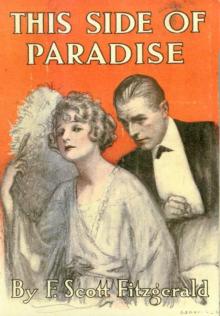 This Side of Paradise
This Side of Paradise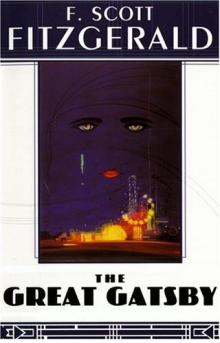 The Great Gatsby
The Great Gatsby Tender Is the Night
Tender Is the Night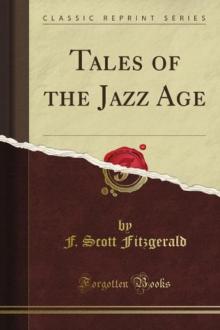 Tales of the Jazz Age (Classic Reprint)
Tales of the Jazz Age (Classic Reprint)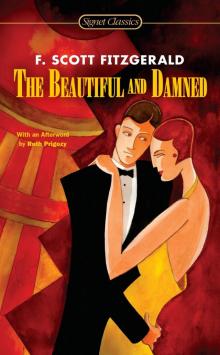 The Beautiful and Damned
The Beautiful and Damned The Pat Hobby Stories
The Pat Hobby Stories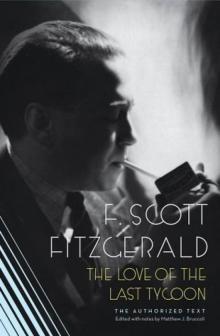 The Love of the Last Tycoon
The Love of the Last Tycoon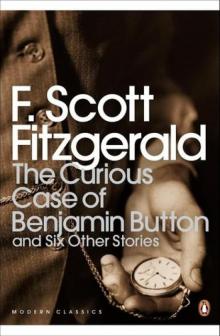 The Curious Case of Benjamin Button and Six Other Stories
The Curious Case of Benjamin Button and Six Other Stories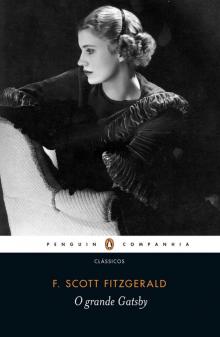 O Grande Gatsby (Penguin)
O Grande Gatsby (Penguin)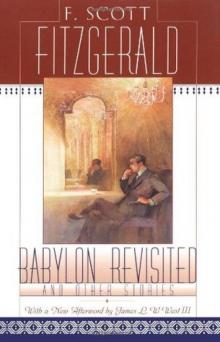 Babylon Revisited and Other Stories
Babylon Revisited and Other Stories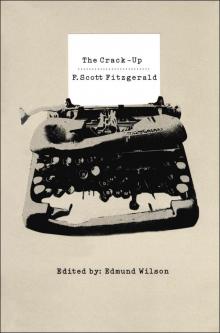 The Crack-Up
The Crack-Up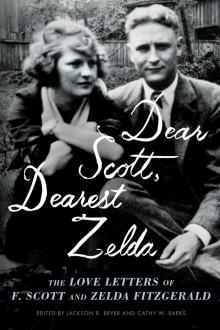 Dear Scott, Dearest Zelda
Dear Scott, Dearest Zelda The Fantasy and Mystery Stories of F Scott Fitzgerald
The Fantasy and Mystery Stories of F Scott Fitzgerald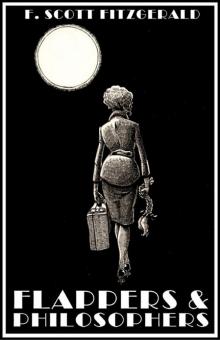 Flappers and Philosophers
Flappers and Philosophers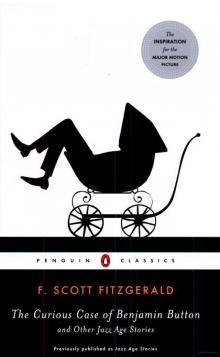 The Curious Case of Benjamin Button and Other Jazz Age Stories (Penguin Classics)
The Curious Case of Benjamin Button and Other Jazz Age Stories (Penguin Classics)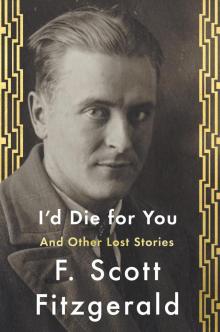 I'd Die For You
I'd Die For You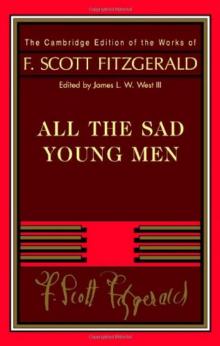 All the Sad Young Men
All the Sad Young Men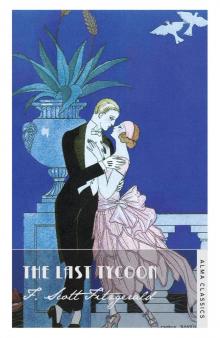 The Last Tycoon
The Last Tycoon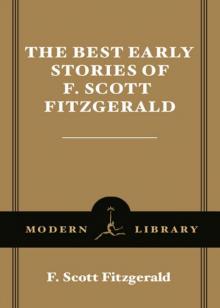 The Best Early Stories of F. Scott Fitzgerald
The Best Early Stories of F. Scott Fitzgerald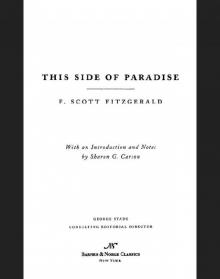 This Side of Paradise (Barnes & Noble Classics Series)
This Side of Paradise (Barnes & Noble Classics Series)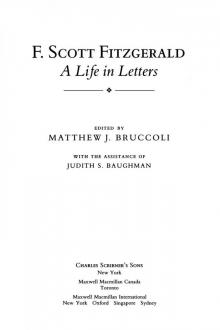 A Life in Letters
A Life in Letters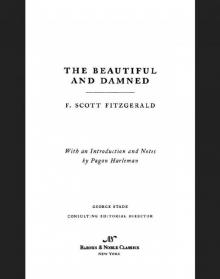 Beautiful and Damned (Barnes & Noble Classics Series)
Beautiful and Damned (Barnes & Noble Classics Series)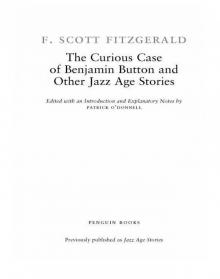 The Curious Case of Benjamin Button and Other Jazz Age Stories
The Curious Case of Benjamin Button and Other Jazz Age Stories Tales of the Jazz Age
Tales of the Jazz Age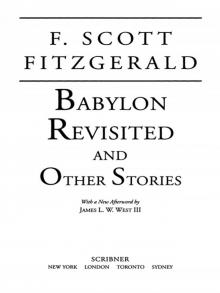 Babylon Revisited
Babylon Revisited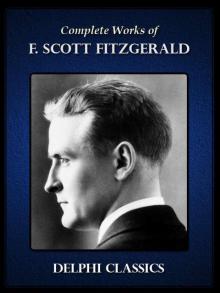 Complete Works of F. Scott Fitzgerald UK (Illustrated)
Complete Works of F. Scott Fitzgerald UK (Illustrated)